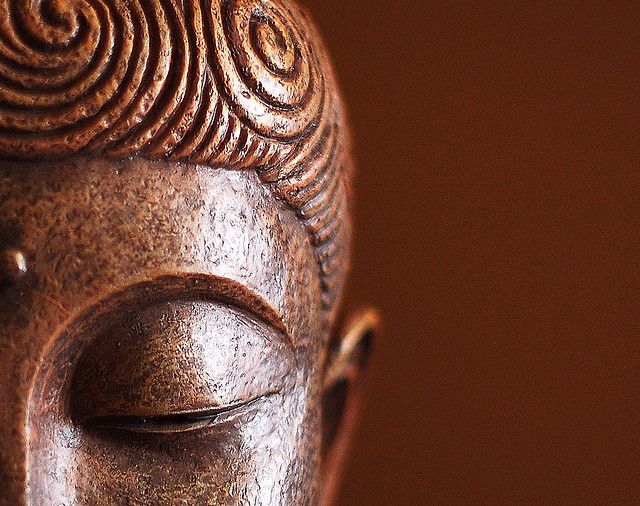How do we start to embody mindfulness in all areas of our life?
I believe most of us tend to compartmentalise all areas of our lives. We have work, family, hobbies, exercise and mindfulness practice. We open and close each box and hide the the ones we don’t like at the bottom of the pile.
We go to work, come home, exercise, relax and meditate (not necessarily in that order) but it tends to make all aspects of our lives easier to deal with. If we can separate things, then we can block out areas where we feel unbalanced—when in fact, our life experiences and the different things we do are all just a flow of our reality.
In the beginning when we begin to practice mindfulness, it is helpful to box things up. However when we just use mindfulness (the practice of being awake in our present moment experience) in our meditation practice and not into our daily life, it can cause imbalance and conflict. How can we just be mindful for 10, 20, 30 minutes in meditation a day but not accept the reality of the present moment in life?
When we practice mindfulness, we step into our holistic self in an awakened state. By this I mean we see all aspects of our inner world—the good, the bad and the ugly.
It’s when we don’t give ourselves time off from all the thinking and doing, life becomes difficult and distorted.
My mind likes to think that I am a mindfulness teacher most of the time. To my mind, this is one box where all the other boxes sit in—so to my mind, I should be happy all of the time, and this is where the conflict begins.
Because I do this amazing job and help so many people, the universe or higher powers should make things easy for me, but I constantly learn lessons that show me this is not true.
Recently I have been feeling way out of balance. Life has been nothing but work, and I haven’t had a day off in what feels like forever, which has left me feeling tired, grumpy and self absorbed.
In the beginning of the year, I closed my holistic clinic and found myself without a work home, which meant I had to find a new venue for my meditation classes. Finally I found somewhere I envisioned to be our perfect meditation room and we could all feel settled again. However this was so far from the truth. The room next to our class was holding a diet class and while I was guiding the meditation, all I could hear was the diet teacher giving food advice (and in my tired judgemental state, it was really bad advice). People even started coming into our room to take chairs.
I was trying to be calm, but inside, my mind was shouting, “F*** this I have had enough!” I was so mad and worse, embarrassed. My mind had jumped into blaming mode, wondering how I could have avoided this, thinking I had let people down, and thinking I had to find a solution quickly so I didn’t feel like such a bad person anymore. I was in self-blame city!
It took me a few days to snap out of it.
When I gave myself space, I realised that this is the way my mind works. It turns within and places the blame on me because I could have done better. However the beauty was that in settling into the feelings of disappointment, the self-blame began to calm. In reflection I could see that I showed myself no love or compassion which are the two things I teach my clients on a daily basis.
I had been so busy trying to be a mindfulness teacher 24/7 that when something went wrong I reverted back into past conditioned experiences. My mind is conditioned to avoid feeling bad by planning to have happiness in the future—I will be happy when I achieve X Y Z. The truth was that I needed to find a balance that allowed me to sit in the uncomfortable emotions as much as I enjoyed sitting in the enjoyable emotions. Allow and accept baby!
Sometimes we can be blinded by the belief that practicing mindfulness means we have a ticket to bliss town, and my experience that week showed me that was not true. Mindfulness does not equal happiness, it’s about allowing yourself to be with any experience.
An unbalanced life creates an unbalanced mind and this causes the mind to judge. Some judge others and some start to judge themselves. My mind is a fan of the latter. These unpleasant experiences are our life lessons, but the mind would like to believe it’s happening because it’s something we have done wrong.
The truth is mindfulness is not the new anti-depressant, it’s not there to numb our experiences.
We cannot ascend out body, or our emotions. Throughout our lives, we will feel pleasure and we will feel pain. All of us—there is no escaping this fact. When we wake up to this, we can then begin to relate to our experiences as they are in the moment and that is the when we can make positive changes in our life.
When we feel pain, whether it’s physical, emotional, mental or spiritual, our natural instinct may be to push it away by trying to barter with our emotions. We ask, how can we make this go away? What can we say or do to take this sh*t away Practicing mindfulness has great benefits to our well being and they come when we practice it at the points we don’t want to.
When we wake up to our reality, we dissolve uncomfortable emotions a lot quicker than when we spend all our time in our head, hunting for solutions—this means things can return to a balanced state sooner. When we practice, and begin to notice the benefits, we don’t feel the constant need to push things away.
Mindfulness allows us to ask, what I feel, are the two most important questions in life:
1. Is this something I need to let go of?
2. Is this something I need to turn toward?
Many spiritual practices encourage us to move out of our inner world and to reach for some higher source, to spiritually bypass our uncomfortable feelings. Mindfulness instead encourages us to look inward and recognise what it is our mind and body are trying to deal with in this very moment.
If truth be told, now is all we have.
Relephant:
Dear Supposed to, Should Be & Maybe Not: Bite Me.
Author: Lyndsey Burton
Editor: Catherine Monkman
Photo: Jon Fife/Flickr







Read 3 comments and reply